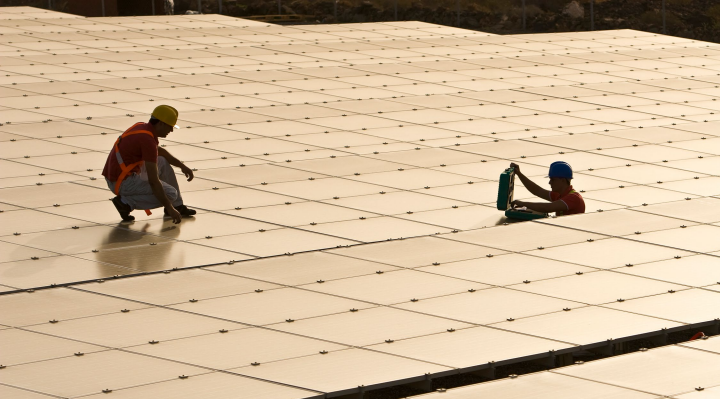 INFRA
INFRA
 INFRA
INFRA
 INFRA
INFRA
Google Inc. has said it’s on track to use all renewable energy for all of its operations, including its data centers and offices, by early next year.
The milestone means Google will have achieved its stated goal a full eight years ahead of schedule, after having initially planned to get there by the year 2025.
It should be noted that Google is running on 100 percent renewable energy in a roundabout kind of way. The energy it uses won’t all come directly from renewable sources as it will still be plugged into the electrical grid, and be able to draw on that energy when needed. However, the company will instead purchase renewable energy that’s equivalent to the total electricity consumption of its entire global network of data centers and offices.
“I’m thrilled to announce that in 2017 Google will reach 100 percent renewable energy for our global operations,” Google Senior Vice President of Technical Infrastructure Urs Hölzle said in a blog post.
Google began its renewable energy push back in 2010 when it signed an agreement to purchase electricity from a 114-megawatt wind farm located in Iowa. Since then, Google has signed dozens of other contracts to purchase renewable energy from sources located across the world. By 2017, Google will almost double its annual purchases of renewable energy, thereby matching the total energy consumption requirements of its global infrastructure, Hölzle explained.
Simultaneously, Google has also made great strides to trim its total energy consumption. In its 2016 environmental report, Google revealed that improvements in the design of its data centers mean they now require about 50 percent less energy than the average data center. The company says that its new data center designs means that virtually all of the energy it consumes goes into powering its information technology equipment, with only a small fraction used for non-computing purposes such as cooling and power conversion.
As a result of these improvements, Google’s global data centers had an average annual power usage effectiveness rating of 1.12 in 2015, significantly lower than the global average of 1.7.
Using renewable energy helps Google in many ways. Besides making good press for the company by reducing its carbon footprint, the move also helps it to save money, Hölzle said. Energy costs are one of Google’s largest operating expenses, and that renewable energy helps reduce them. That’s because the cost of wind-powered energy has fallen by almost 60 percent since Google began its initiative, while solar power costs have decreased by 80 percent over the same period of time. In addition, renewable energy costs are more stable than regular electricity, which helps protect Google from potential increases in the cost of non-renewable energy.
Google is now invested in 20 wind and solar energy projects around the world, Hölzle said. The company announced six agreements to purchase some 842 megawatts of renewable energy in 2015, which represents the largest aggregate purchase ever by a non-utility company.
Google will spend a total of $3.5 billion globally in the next few years to buy 2.6 gigawatts of renewable energy, which is “ bigger than many large utilities and more than twice as much as the 1.21 gigawatts it took to send Marty McFly back to the future,” Hölzle said, in reference to the iconic 1985 “Back to the Future” movie.
THANK YOU